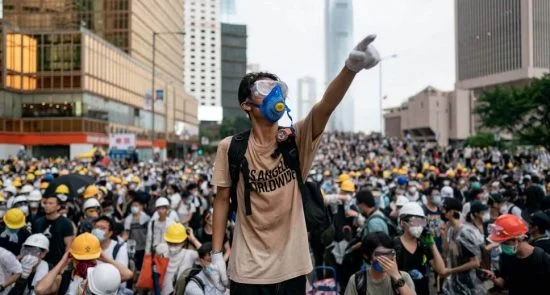Human rights August 24, 2019
Short Link:People Power has Won a Famous Victory in Hong Kong
The suspension of the draft law to allow extradition from Hong Kong to the rest of China is a triumph for democracy and human rights. It is a significant victory for people power, and a welcome check on the reach of Chinese totalitarianism.
Ariana News Agency-
Carrie Lam, Hong Kong’s chief executive, said the “explanation and communication” of the bill had not been adequate, and announced that her government would “pause and think”.
The decision to de-escalate the confrontation with the people of Hong Kong, who had taken to the streets in unprecedented numbers, was presumably taken in Beijing. A spokesperson for the Chinese central government said it “expresses its support, respect and understanding” for the decision.
This is not the end of the tension between the 7 million people of Hong Kong and the Chinese government, but it is a hopeful sign that there are limits to Beijing’s willingness to undermine the rule of law in the “special administrative region”. It suggests that the doctrine of “one country, two systems”, set out in the 1980s by China’s then-leader Deng Xiaoping, still means something.
This is not because the Chinese government respects human rights, the rule of law or even pluralism. The desperate plight of the Uighur Muslims in western China is testament to that. The Deng doctrine is simple pragmatism writ large. But it is encouraging that the balance of advantage, from Beijing’s point of view, still lies in preserving Hong Kong’s special status.
The city’s wealth and its place in the global financial system give the Chinese government a powerful incentive to abide by some of the most important terms of the 1997 handover from the UK. But what yesterday’s decision also shows is that Beijing has no wish to suppress by force the legitimate demands of the Hong Kong people.
In this, the UK government’s policy of keeping a low profile is probably justified. There are many people in Hong Kong who demand that the UK assert itself more forcefully as a guarantor of the city’s freedoms, and angrily condemn its cowardice in failing to oppose Beijing’s encroachment more strenuously.
But they should understand that Deng’s policy might just as well be called “one country, two world views”. For the Chinese leadership, any assertiveness by the former colonial power, with its ignoble history of the opium wars, would be seen as a challenge to Chinese sovereignty, and could be counterproductive.
The better guarantors of the rights of the people of Hong Kong are the people themselves. It is their prosperity, together with their willingness to protest peacefully, which has seen off the latest attempt to weaken these rights.










